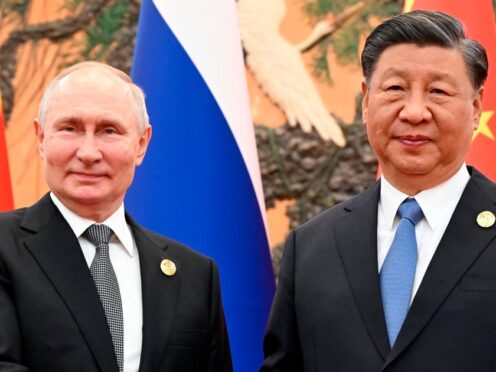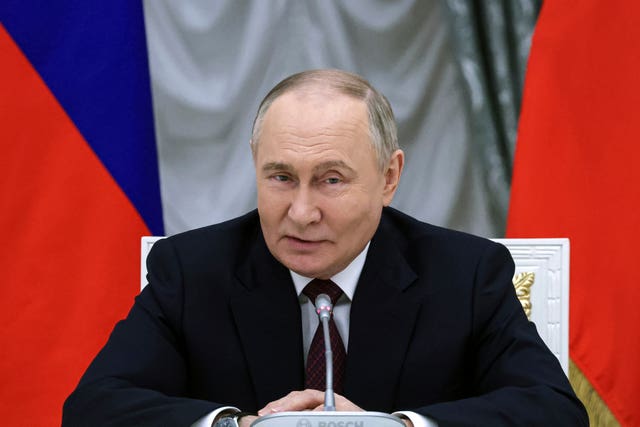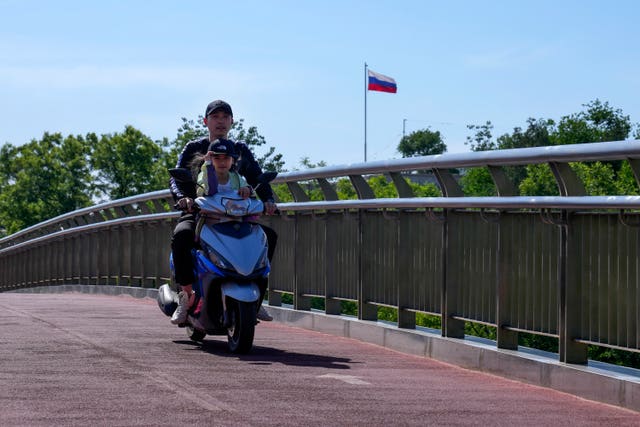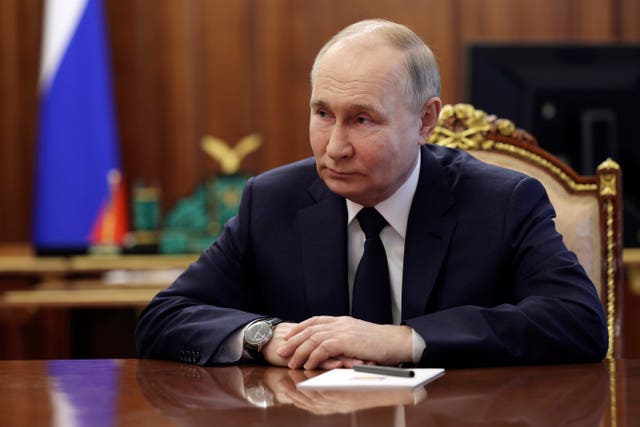
Russian President Vladimir Putin says his regime is prepared to negotiate over the conflict in Ukraine.
The Russian leader made the statement in an interview with Chinese media on the eve of his visit to partner Beijing, which has backed Moscow in its full-scale invasion of its neighbour.
“We are open to a dialogue on Ukraine, but such negotiations must take into account the interests of all countries involved in the conflict, including ours,” Mr Putin was quoted as saying by the official Xinhua News Agency on Wednesday.

The Russian leader’s two-day trip starting Thursday comes as his country’s forces have pressed an offensive in Ukraine’s Kharkiv region that began last week in the most significant border incursion since the full-scale invasion began, forcing almost 8,000 people to flee their homes.
Along with Moscow’s efforts to build on its gains in the nearby Donetsk region, the two-year-old war has entered a critical stage for Ukraine’s depleted military, which is awaiting new supplies of anti-aircraft missiles and artillery shells from the United States.
“We have never refused to negotiate,” Mr Putin was quoted as saying by Xinhua. “We are seeking a comprehensive, sustainable and just settlement of this conflict through peaceful means.
“We are open to a dialogue on Ukraine, but such negotiations must take into account the interests of all countries involved in the conflict, including ours.”
Ukrainian President Volodymyr Zelensky has said any negotiations must include a restoration of Ukraine’s territorial integrity, the withdrawal of Russian troops, the release of all prisoners, a tribunal for those responsible for the aggression and security guarantees for Ukraine.

China claims to take a neutral position in the conflict but has backed Moscow’s contentions that Russia was provoked into attacking Ukraine by the West, despite Mr Putin’s public avowals of his desire to restore Russia’s century-old borders as the reason for his assault.
The Kremlin said in a statement that during their talks, Mr Putin and Chinese leader Xi Jinping will “have a detailed discussion on the entire range of issues related to the comprehensive partnership and strategic co-operation and determine the new directions for further development of co-operation between Russia and China and also have a detailed exchange of opinions on the most acute international and regional issues”.
The visit furthers the effort by China and Russia to topple the US-led Western democratic order in favour of a more authoritarian model that crushes political opposition, human rights and freedom of speech.
Speaking on Tuesday in the upper house of the Russian parliament, Foreign Minister Sergey Lavrov said Moscow and Beijing are “objectively interested in maintaining our lead in efforts to establish a more fair and democratic world order”.
“Russia and China aren’t alone in their efforts to reform an international system and help establish a multipolar global order,” he said.
Mr Lavrov noted that the “duet of Moscow and Beijing plays a major balancing role in global affairs,” adding that “the Russian president’s forthcoming visit to (China) will strengthen our joint work”.

Moscow has forged increasingly close ties with Beijing as the war has dragged into a third year, diverting the bulk of its energy exports to China and relying on Chinese companies to import high-tech components for Russian military industries to circumvent Western sanctions.
The Russia-China military ties have also strengthened.
They have held a series of joint war games in recent years, including naval drills and patrols by long-range bombers over the Sea of Japan and the East China Sea.
Russian and Chinese ground forces also have deployed to the other country’s territory for joint drills.
China remains a major market for the Russian military, while also massively expanding its domestic defensive industries, including building aircraft carriers and nuclear submarines.
Mr Putin has previously said that Russia has been sharing highly sensitive military technologies with China that helped significantly bolster its defence capability.
In October 2019, he mentioned that Russia was helping China to develop an early warning system to spot ballistic missile launches — a system involving ground-based radar and satellites that only Russia and the US possessed.

Enjoy the convenience of having The Sunday Post delivered as a digital ePaper straight to your smartphone, tablet or computer.
Subscribe for only £5.49 a month and enjoy all the benefits of the printed paper as a digital replica.
Subscribe